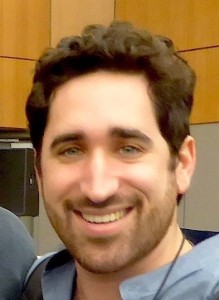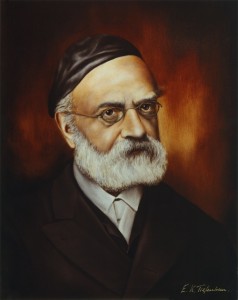Musings from Students of the Pardes Institute of Jewish Studies in Jerusalem
Posted on March 6, 2014 by Max Einsohn
 This week we begin reading the third book of the Torah, Sefer Vayikra. This book, commonly known by its Greek name Leviticus, consists of laws of sacrifices, ritual purity, and kashrut. Sefer Vayikra is also referred to as “Torat Cohanim” relating to this book’s emphasis on the laws and behavior of the Priests, or Cohanim. Over the next 11 weeks, we will re-experience Vayikra, and its many important teachings.
This week we begin reading the third book of the Torah, Sefer Vayikra. This book, commonly known by its Greek name Leviticus, consists of laws of sacrifices, ritual purity, and kashrut. Sefer Vayikra is also referred to as “Torat Cohanim” relating to this book’s emphasis on the laws and behavior of the Priests, or Cohanim. Over the next 11 weeks, we will re-experience Vayikra, and its many important teachings.
But wait… are the teachings found in Sefer Vayikra actually important? In parashat Kedoshim, we learn the phrase “You shall love your neighbor as yourself” (Vayikra 19:18) suggesting a profound moral dictum referring to the ideal relationship between humans. Not to denigrate the “golden rule” lesson given to us in Sefer Vayikra… it’s an important concept… but does the rest of this book, full of archaic and irrelevant practices of Temple sacrifices relate to us today? Why should we continue to read about, and study the primitive and outdated laws found in Sefer Vayikra?
In parashat Yitro, read almost seven weeks ago, God calls out (“Vayikra”) to Moses saying, “Say to the house of Jacob, and tell the children of Israel… You shall be unto Me a kingdom of priests, a holy nation” (Shemot 19:6). This gesture of destiny is dependent on the previous verse “…if you hear My voice, and guard My covenant…” (Shemot 19:5). I must admit that the conditional nature of this verse scares me a bit. I would love to include myself in the “nation of priests” described in Shemot 19:6 but am not sure that my current Jewish practice includes all the aspects of the covenant between the Israelites and God at Mount Sinai.
Can you remember the last time you sacrificed an ox in a ritual manner, in front of a Cohen, or priest, as decreed to us in Vayikra? Ever done anything that like that? Me neither.
Since Jewish tradition stopped requiring sacrificial offerings after the destruction of the Second Temple by the Romans in 70 CE, why must we still read about how to offer ourselves to God via animal sacrifice? What relevance does accessing this seemingly obsolete text have for us today?
 According to the 19th century Tzadik Rabbi Sampson Raphael Hirsch, Sefer Vayikra and the notion of sacrificial offerings in our Jewish heritage has much to do with each of us today. Similar to Rashi in his stylistic analysis of shorashim (Hebrew letter roots) Rabbi Hirsch teaches us to view the sacrifices as the central manner in which our ancestors connected personally, and communally to God. He describes that the root of the Hebrew word for sacrifice “קרבן” is in fact the letters ב<-ר<-ק also serving as the root for a similar Hebrew infinitive “להקריב” meaning “to get closer.” Thus Rabbi Hirsch teaches us that for our ancestors, animal sacrifice was the way to get closer to God.
According to the 19th century Tzadik Rabbi Sampson Raphael Hirsch, Sefer Vayikra and the notion of sacrificial offerings in our Jewish heritage has much to do with each of us today. Similar to Rashi in his stylistic analysis of shorashim (Hebrew letter roots) Rabbi Hirsch teaches us to view the sacrifices as the central manner in which our ancestors connected personally, and communally to God. He describes that the root of the Hebrew word for sacrifice “קרבן” is in fact the letters ב<-ר<-ק also serving as the root for a similar Hebrew infinitive “להקריב” meaning “to get closer.” Thus Rabbi Hirsch teaches us that for our ancestors, animal sacrifice was the way to get closer to God.
If we read Sefer Vayikra through the lens of Rabbi Hirsch, much is revealed to us in terms of human nature, and our innate desire to connect. Noticing the order of the sacrifices told to us in parashat Vayikra we uncover a significant teaching relating to our lives today. Parashat Vayikra teaches us that no matter how rich our ancestors were, each Nefesh (each soul) can connect with God. Whether cow or bird, grain or fruit, Kol Nefesh can offer what they have to God in hopes of coming closer.
Furthermore, presenting the Olah and Shlamim offerings first, before the Sin offering (Hattat), parashat Vayikra teaches us that the more-valued sacrifices are voluntary ones, meant to connect the supplicant with God as an expression of his / her free will. This massive hidush, or insight, has rested in our text since we received our Torah at Sinai, and, I would like to suggest, reflects an important truth about humanity that remains true today.
 If we go back for a moment to Sefer Bereishit (commonly known as Genesis), we learn about the source of our innate desire to connect through the creation of Adam and Eve. In Bereishit 2:7 God creates man, and 11 verses later, God realizes “…it is not good that man should be alone” (Bereishit 2:18) thus leading to the creation of animals. But God doesn’t stop there. A few verses later, “God made woman, and brought her to man” (Bereishit 2:22-23). Why does God create another creature for Adam to connect to? The perpetuation of humankind does not seem to be on God’s mind at this point in our narrative…. So, why another human? I believe that the creation of Eve, as an evaluative reaction to the loneliness of Adam, reveals God’s recognition of human nature’s deeply embedded desire to connect. Our desire to connect, it seems, is part of our human make up “from the get-go.”
If we go back for a moment to Sefer Bereishit (commonly known as Genesis), we learn about the source of our innate desire to connect through the creation of Adam and Eve. In Bereishit 2:7 God creates man, and 11 verses later, God realizes “…it is not good that man should be alone” (Bereishit 2:18) thus leading to the creation of animals. But God doesn’t stop there. A few verses later, “God made woman, and brought her to man” (Bereishit 2:22-23). Why does God create another creature for Adam to connect to? The perpetuation of humankind does not seem to be on God’s mind at this point in our narrative…. So, why another human? I believe that the creation of Eve, as an evaluative reaction to the loneliness of Adam, reveals God’s recognition of human nature’s deeply embedded desire to connect. Our desire to connect, it seems, is part of our human make up “from the get-go.”
Returning to this week’s parasha, I would like to suggest that the sacrificial rituals found in our Torah reflect our sincere and heartfelt longing to connect to God. Interestingly though, this week’s parasha Vayikra, flips this notion on its head (V’naHafochu- it sure is Adar!!!). Vayikra, meaning “and He called,” refers to God calling out to Moses from the recently complete Miskan (tent of meeting).
But does God only call out to Moses? Our Torah reveals to us that God calls out to many biblical characters, and even speaks through the Torah itself. “To you, O’ man do I call and my voice to the children of men”(Proverbs 8:4), describes how even today our Torah… our God… calls out to us, yearning to connect. Parashat Vayikra teaches us that humans naturally desire connection with each other, and with God. So clearly, Sefer Vayikra, like God, is calling out to us. Are you listening? Shabbat Shalom.